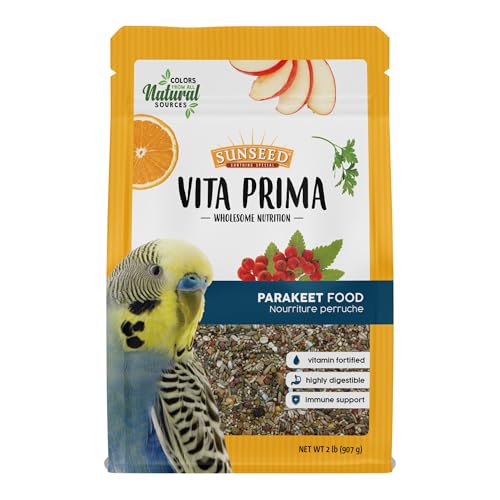
A pair of plum-headed parakeets eating seed from a hand.
Parakeet Food - Seeds Blends
Advertisement
We use a few different food blends to keep things interesting for our bird. Dr. Harvey's is one of the favorites.
As an Amazon Associate I earn from qualifying purchases.
Seed Mixes: Seed mixes are a common staple in a parakeet's diet and often include a combination of millet, canary seed, safflower seed, and sunflower seed. While seeds are high in fat and energy, they should not be the sole component of a parakeet's diet as they lack essential nutrients.
Pellets: Pelleted diets offer a more balanced and nutritionally complete option for parakeets. They are formulated to provide essential vitamins, minerals, and nutrients in each bite, reducing the risk of dietary deficiencies.
Fresh Fruits and Vegetables: Fresh fruits and vegetables are essential for a well-rounded diet for parakeets. Offer a variety of options such as apples, grapes, broccoli, carrots, and leafy greens to ensure they receive a diverse range of vitamins and minerals.
Sprouted Seeds: Sprouted seeds are seeds that have begun to germinate, making them easier to digest and more nutritious for parakeets. They are rich in enzymes, vitamins, and amino acids, providing a healthy and tasty addition to their diet.
Treats: Treats such as millet sprays, dried fruits, and nuts should be offered sparingly and in moderation. While they can be a fun and tasty addition to your parakeet's diet, excessive consumption can lead to obesity and other health issues.
Millet, Nutriberries & Chew Sticks
Advertisement
We use these delicious snacks and treats to help train our bird. She loves all of these.
As an Amazon Associate I earn from qualifying purchases.
The Best Parakeet Food
Providing quality food is crucial for the health and longevity of parakeets. A balanced, species-specific diet enhances their immune system, feather health, energy levels, and overall well-being. By preventing nutritional deficiencies and reducing the risk of obesity, quality food plays a vital role in extending a parakeet’s lifespan. Additionally, proper nutrition supports cognitive function and behavioral stability, contributing to a happier and healthier life for these delightful birds. Ensuring that parakeets receive the best possible diet is a fundamental aspect of responsible pet ownership, promoting a long, vibrant life for these cherished companions.
More food & treats for your parakeet:
Parakeet Food & Treats | Parakeet Food | Feed & Pellets | Millet | Cuttle Bones | Treats | Fresh Food






